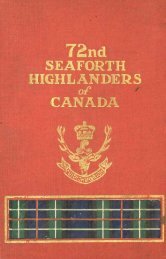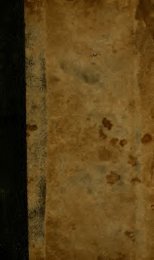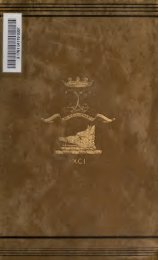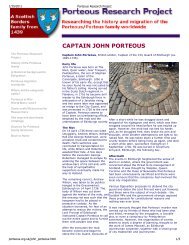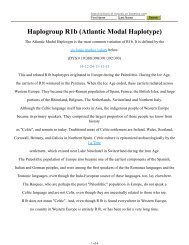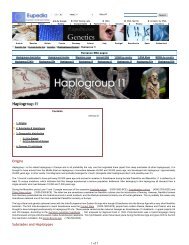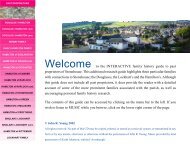Wedderburn book; a history of the Wedderburns in ... - waughfamily.ca
Wedderburn book; a history of the Wedderburns in ... - waughfamily.ca
Wedderburn book; a history of the Wedderburns in ... - waughfamily.ca
You also want an ePaper? Increase the reach of your titles
YUMPU automatically turns print PDFs into web optimized ePapers that Google loves.
Ixviii. . THE WEDDERBUllX BOOK.<br />
Introd. but died s.p. soon after ; and <strong>the</strong> o<strong>the</strong>r, Elizabeth, was <strong>the</strong> wife <strong>of</strong> Alexander Read<br />
<strong>of</strong> Tiirfbeg, <strong>in</strong> that county, and liad a numerous family, one <strong>of</strong> wliom, Cathar<strong>in</strong>e<br />
(died 1778), was em<strong>in</strong>ent as a portrait-pa<strong>in</strong>ter, both <strong>in</strong> oils and pastels. There<br />
are several portraits <strong>of</strong> various members <strong>of</strong> <strong>the</strong> family by her, <strong>in</strong>clud<strong>in</strong>" one<br />
pa<strong>in</strong>ted from memory and after his death <strong>of</strong> Sir John W'edderburn, <strong>the</strong>^ fifth<br />
baronet, whose <strong>history</strong> I have now to give.<br />
Sir John <strong>Wedderburn</strong>, fifth baronet <strong>of</strong> Blackness, was bom <strong>in</strong> 170-i, and<br />
was no doubt at one time <strong>in</strong>tended to succeed his fa<strong>the</strong>r <strong>in</strong> his<br />
Baronef'ot ^^ various <strong>of</strong>fices. But after <strong>the</strong> purchase <strong>of</strong> Blackness <strong>in</strong> 1718<br />
rJta.'^"^^' '^'^'^ '^'^^ ''''^ succession to <strong>the</strong> baronetcy, his fa<strong>the</strong>r may have<br />
altered his plans <strong>in</strong> ref,'ard to him. This seems probable from<br />
<strong>the</strong> fact that <strong>the</strong>re are no references to John <strong>Wedderburn</strong> as pursu<strong>in</strong>g any<br />
pr<strong>of</strong>ession between 1725 and 1737, when Sir Alexander's affairs had become<br />
<strong>in</strong>volved and it was essential that his eldest son should make his way <strong>in</strong> <strong>the</strong><br />
world. There are <strong>the</strong>n several allusions to his act<strong>in</strong>g as arbitrator, commissioner,<br />
and constable depute at Dundee between 1739 and 1741, but I doubt if he<br />
<strong>ca</strong>n be said to have been successful. It is certa<strong>in</strong> that on his fa<strong>the</strong>r's death he<br />
found himself <strong>in</strong> very straitened circumstances, and with <strong>the</strong> burden <strong>of</strong> a<br />
numerous family. He now removed from Dundee to a small farm near Newtyle,<br />
and was liv<strong>in</strong>g <strong>the</strong>re, far from prosperously, when Pr<strong>in</strong>ce Charles Edward<br />
set foot <strong>in</strong> Scotland <strong>in</strong> 1743.<br />
I have endeavoured, at pp. 2fi5-284 <strong>of</strong> this volume to trace Sir John's<br />
movements at this time and to estimate his motives <strong>in</strong> jo<strong>in</strong><strong>in</strong>g<br />
rtie^l!^''" t'le Pr<strong>in</strong>ce and his subsequent attitude to <strong>the</strong> <strong>ca</strong>use he had<br />
espoused. At his trial, <strong>the</strong> defence which he set up, or which<br />
was set up for him, was that he had been forced to jo<strong>in</strong> <strong>the</strong> Pr<strong>in</strong>ce a"-a<strong>in</strong>st<br />
his will, but <strong>the</strong>re is a letter from him to Mr. Thomas K\-d, written immediately<br />
after his <strong>ca</strong>pture, <strong>in</strong> which he speaks <strong>of</strong> hav<strong>in</strong>g soon found out <strong>the</strong> mistake<br />
he had made <strong>in</strong> reject<strong>in</strong>g Mr. Kyds advice to stay at home, which is<br />
altoge<strong>the</strong>r <strong>in</strong>consistent witli <strong>the</strong> defence <strong>of</strong> duress. A writer on <strong>the</strong> <strong>history</strong> <strong>of</strong><br />
<strong>the</strong> Jacobite times has suggested that it was "Sir John's poverty which consented,"<br />
but not only are no facts quoted <strong>in</strong> support <strong>of</strong> this statement, but <strong>the</strong> rest<br />
<strong>of</strong> that account <strong>of</strong> Sir John is very <strong>in</strong>accurate, and we must not forget ei<strong>the</strong>r<br />
<strong>the</strong> constant adherence <strong>of</strong> his family to <strong>the</strong> House <strong>of</strong> Stuart from <strong>the</strong><br />
time <strong>of</strong> old K<strong>in</strong>gennie to that <strong>of</strong> his own fa<strong>the</strong>r,^ or <strong>the</strong> fact that both<br />
his bro<strong>the</strong>rs, Robert and Thomas, were also adherents <strong>of</strong> <strong>the</strong> Pr<strong>in</strong>ce. It is<br />
possible that after he had at first jo<strong>in</strong>ed <strong>the</strong> Pr<strong>in</strong>ce, he returned home<br />
and <strong>the</strong>n once more jo<strong>in</strong>ed <strong>the</strong> Jacobite forces. There is evidence that he was<br />
at Gladsmuir and at llolyrood <strong>in</strong> September 1745, and that he collected <strong>the</strong><br />
excise <strong>in</strong> Perth for <strong>the</strong> Pr<strong>in</strong>ce from November to January <strong>in</strong> <strong>the</strong> follow<strong>in</strong>g<br />
year. He must <strong>the</strong>n have jo<strong>in</strong>ed <strong>the</strong> army as it passed northward on <strong>the</strong><br />
retreat from Derby, and was thus without doubt at Culloden, where he was<br />
taken prisoner on <strong>the</strong> defeat <strong>of</strong> <strong>the</strong> Pr<strong>in</strong>ce. From this date until <strong>the</strong> day <strong>of</strong><br />
his execution, <strong>the</strong> facts <strong>in</strong> regard to him are clear. He was brought up to<br />
London, and was imprisoned <strong>the</strong>re <strong>in</strong> New Southwark Gaol from May 20 until<br />
his execution on Nov. 2S 174G. There are some five letters from him at this<br />
period to his wife, his friend Mr. Tliomas Kyd, and to a lady who had<br />
concerned herself on his bchalt, but whose name does not appear. His fellowprisoners<br />
were Sir James Kuiloch and his two bro<strong>the</strong>rs, Mr. Farquharson <strong>of</strong><br />
Monaltrie, Mr. Kattray <strong>of</strong> fori., and a Mr. Stuart, all <strong>of</strong> whom shared one room<br />
with him, and he was also bometimes allowed <strong>the</strong> companionship <strong>of</strong> his second<br />
6on James, <strong>the</strong>n a lad <strong>of</strong> ti.xtecn, wlio had made his way up to London on his<br />
» It is notowonhy, I iMuk. tUt »Uro <strong>in</strong> 17IJ tlic Dundee Town Council (29 July) appo<strong>in</strong>ted <strong>of</strong>ficers<br />
todtfer.a tl.e town ,„ yew U ". t^.,lrrn !nv^,„n to be made by <strong>the</strong> pretender with a foreign<br />
force from jwirU 1-cjodJ »» iU.L.U, loW;, no <strong>Wedderburn</strong> is so appo<strong>in</strong>ted.


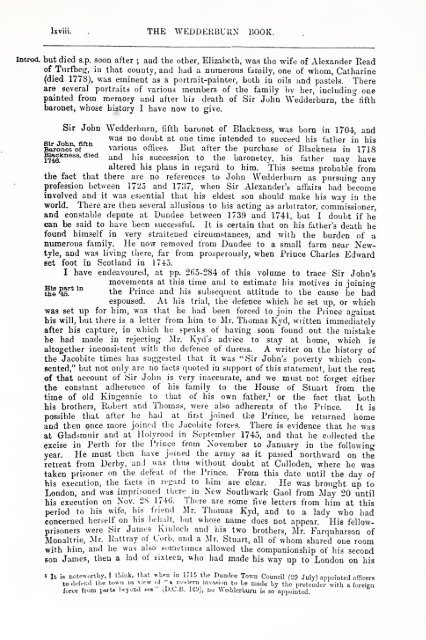
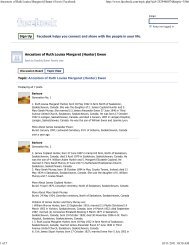
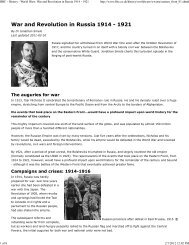
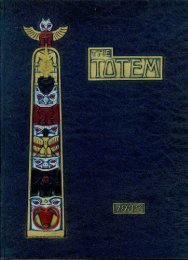
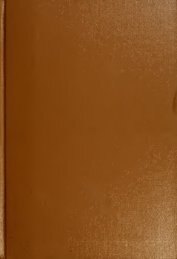
![SS Sir Francis [+1917] - waughfamily.ca](https://img.yumpu.com/49438251/1/190x245/ss-sir-francis-1917-waughfamilyca.jpg?quality=85)
